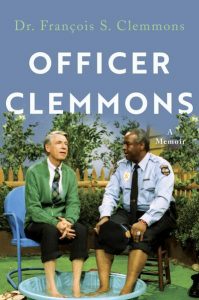
Dear Mr. Rogers: A Letter From Officer Clemmons
On Friendship, the Neighborhood, and Gratitude
Dear Fred,
My guardian angels, spirit guides, ancestors, literary agent, and many friends and acquaintances have urged me to write this book for over twenty years. I’ve been amazed by the unabashed curiosity that is readily shown by folks—those close to me, as well as outright strangers. I’m most frequently asked, “Was he really like that?” meaning your television persona. Usually my initial response is simply “Yes!”
Early on, I fully grasped your enormous popularity, and at the same time, I learned about your unusual and immense patience. It’s so amazing to me that even during dinner as we’d travel across the country, I’d watch you permit complete strangers to greet you, interrupt meals, and tell you their life stories. You would stop eating and patiently wait to sign your name and a gentle message that they might request. You never got angry or annoyed.
The questions from your fans rarely stop with “Was he really like that?” So, I simply put on the patience, like I saw you wear so often, and prepare to listen.
“What was it like to work with him?” they continue. “Is he that nice?” “Does he ever get angry?” “Was he a Christian?” “Did he go to church and preach?” “Was he gay?” It’s mostly the men or fathers who ask that last question, and usually in private.
“Was he really a Navy SEAL?” “Was he married?” “Did he have children?” “How long did you work with him?” “Where was the show filmed?” “Where did he live?” Sometimes they want to know, “What was his wife like?” “How’d you meet him?” “Did you make a lot of money?” Some of these questions I can answer easily. Others are more complicated.
When children used to ask me about you, they wanted to know less about the man himself and all about the Neighborhood of Make-Believe: the trolley, the different puppets, the piano player. Some children asked if the Neighborhood was real, but my all-time favorite question from children was, “How did you get out of the television?”
Questions from your many fans partially motivated me to write this book, but the other reason is its uniqueness. Before I started writing, I sat down with twelve or so biographies, prayer books, quotes by you, and songbooks. I googled you extensively and looked at other publications by or about you. I scrutinized everything so I could compare them to what I was attempting to do. I also began the long process of going through my personal archives. I reread our old letters, sifted through photos, and found newspaper clippings and memorabilia I had collected over the years. I wanted to spark a deep impression of the man I wanted to summon in this book. As often as possible, I spent time speaking with numerous educators and academics who had studied your program, either with their students or with their own children. In some cases, with their grandchildren, nieces, and nephews.
After all of this, I concluded that there was one thing in particular that stood out: none of the other publications were authored by a black, gay, ordained person of the theater who had worked intimately with you for over thirty years! Because of that, I felt that I could bring a singularly unique perspective to those years that no one else has. My perspective would offer far more than a one-time encounter at the local restaurant, or even hours spent in a research library. Our relationship was sustained, intense, and elbow-to-elbow. For me, you fulfilled the role of mentor, fan, and surrogate father.
Fred, you were a real person to me. It’s important to me that others know that.
But something was missing. As I wrote about you and your impact on me, I realized that I needed to start from the beginning—from my beginning. Not only how music brought us together, but how it saved me at a tender age. I wish I had been able to tell you some of the stories in this memoir before your death.
Fred, you were a real person to me. It’s important to me that others know that. Lord knows you had your successes and failures like anybody else. But you taught through example not to live down in the valley of disappointment. That we all must learn to rise up and start over again. You practiced it and you helped me to practice it, particularly regarding my biological family. You taught me forgiveness and love. For you, forgiveness and love were action verbs, and it was imperative to live their true meaning one day at a time. Because of you, I was able to seek reconciliation with my father, my stepfather, and my mother—even after their deaths.
The most beautiful gift you gave me, however, was to help me accept that there are no accidents and that our unusual friendship was meant to be. You believed in life after death and that when the time came, we’d reunite in some place. I believe this too.
Until we meet again,
François
__________________________________

Officer Clemmons: A Memoir is available now from Catapult.
François Clemmons
Dr. François S. Clemmons received a bachelor of music degree from Oberlin College and a master of fine arts from Carnegie Mellon University. He also received an honorary doctor of arts degree from Middlebury College. In 1973, he won a Grammy Award for a recording of Porgy and Bess; in 1986, he founded and directed the Harlem Spiritual Ensemble; and from 1997 until his retirement in 2013, Clemmons was the Alexander Twilight Artist in Residence and director of the Martin Luther King Spiritual Choir at Middlebury College in Vermont, where he currently resides.



















